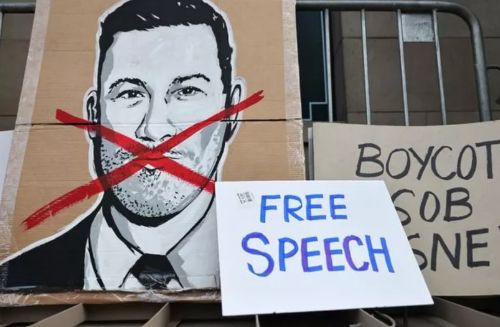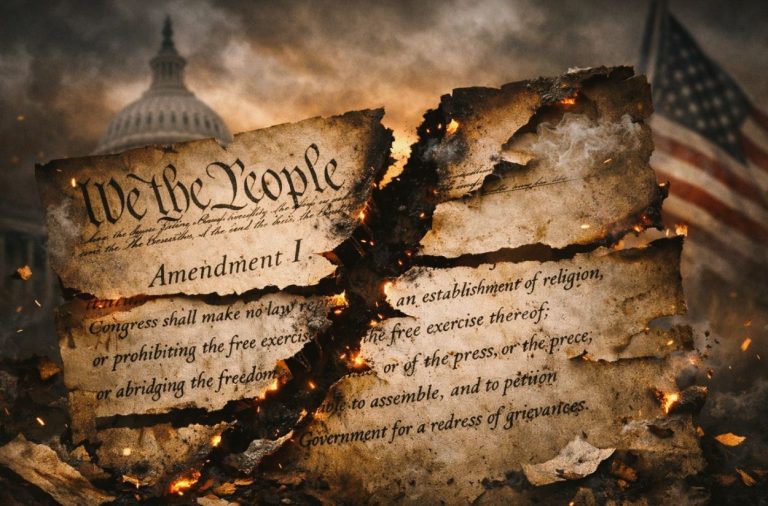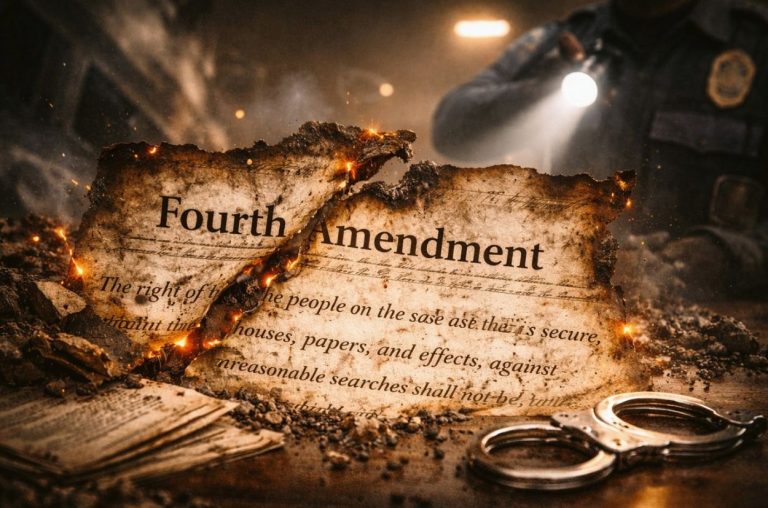

Donald Trump’s shift toward using regulatory, licensing, and educational tools to favor praise and suppress critique is a deeply worrying sign.

By Matthew A. McIntosh
Public Historian
Brewminate
Introduction: A Shift from Criticism to Constraint
In recent weeks, Donald Trump has escalated attacks on sectors foundational to our free republic: media outlets, educational institutions, and public broadcasting. He has suggested revoking broadcast licenses from television networks that are critical of him. At the same time his administration has instructed the Department of Education to favor “patriotic education” when awarding grants.
These moves are not small policy tweaks. They represent an effort to reshape who gets to speak, what histories get taught, and how dissent is framed. Many observers liken this to authoritarian playbooks, from Hitler’s early efforts to silence journalists to propaganda-infused schooling meant to shape youth. The stakes are constitutional, ethical, and deeply cultural.
Media under Pressure: Licenses, Complaints, and Chilling Effects
President Trump has publicly criticized major broadcast networks, saying they provide him “bad press” and implying that they should lose their licenses because of negative coverage. In one instance, he suggested that ABC and NBC’s affiliates might have their licenses revoked for being “an arm of the Democrat Party.”
A concrete example emerged when Jimmy Kimmel Live! was suspended by ABC after remarks Kimmel made about Charlie Kirk’s murder. The suspension came under pressure from FCC Commissioner Brendan Carr, a Trump appointee, the United States government literally bringing its weight to bear to regulate speech. Questioned about whether other networks should face similar action, Trump asked if they should lose their broadcast licenses. Carr has hinted at increased regulatory scrutiny and possible investigations into what he calls “liberal‐leaning shows.” These developments have raised alarm among legal scholars about regulatory authority being used as a tool for political control. (Reuters)
The Federal Communications Commission (FCC), which issues broadcast licenses, is constrained legally. The Communications Act and the First Amendment limit what kinds of content regulation are permissible. Revoking licenses based on political content or critical coverage is unconstitutional on its face. Yet the mere discussion of revocation, threats, or pressure can chill speech. Broadcasters may self-censor to avoid regulatory retaliation.
Education in the Patriotism Agenda: Grants, Curriculum, and Ideological Framing
Parallel to media pressure, the Trump administration has moved aggressively to reshape education policy. The Department of Education now includes “patriotic education” as a supplemental priority in discretionary grants. Programs that teach U.S. history emphasizing founding ideals, national pride, and exceptionalism will be given preference.
Secretary of Education Linda McMahon has framed this priority as teaching that “American history, values, and geography” should be honest, unifying, and inspiring. She argues students need to know the nation’s founding principles, political institutions, and historical progress. Educational materials that present dissonant or critical narratives risk being sidelined if they do not align with the defined patriotic framework.
The Education Department also launched the America 250 Civics Education Coalition, involving over 40 conservative and patriotic groups including Hillsdale College, Turning Point USA, and PragerU. These groups are set to help design programming and teacher training with a celebratory narrative of American history.
Critics warn this framing leaves little room for complex history (slavery, systemic racism, colonialism, civil rights struggles) or for questioning and critical thinking. With curriculum pressure from funding levers, what counts as “accurate, honest, and inspiring” may effectively exclude dissent or uncomfortable truths.
Historical Echoes: Lessons from Authoritarian Regimes
The parallels are not trivial. In Nazi Germany, early in Hitler’s rise the regime persecuted journalists, imposed strict controls over the press, and enacted propaganda campaigns to shape loyalty among youth through the Hitler Youth and related institutions. Educational content was tightly controlled to produce citizens loyal to Nazi ideology.
Other authoritarian regimes have similarly sought control over licensing of media, funding for education, and defining national identity in school curricula. These precedents show that once the state begins to use regulatory power and funding to enforce narrative conformity, the mechanisms of repression tend to follow.
Civil Liberties Groups and Legal Scholars Respond
Legal experts, media watchdogs, civil rights organizations are raising alarms. Some express that these proposals violate the constitutional protections of freedom of speech, freedom of the press, and free inquiry.
The American Civil Liberties Union has pointed out that revoking a broadcast license based on critical coverage would be a content-based restriction. The First Amendment forbids such censorship. The legality of any move to punish or penalize outlets for their editorial stance is deeply in question.
Scholars of education policy warn that once grant programs favor a singular patriotic narrative, schools and teachers may avoid presenting historical truths that complicate national mythologies. They note the risk that minorities and dissenters will be silenced or marginalized.
Press freedom organizations note the effect on journalism: Talk show hosts, editorial writers, news programs may self-censor to avoid regulatory backlash. The potential for misuse of licensing rules or FCC enforcement looms large.
There are ongoing debates in constitutional law about the limits of “public interest” obligations under FCC rules. The FCC does have authority over broadcast licenses. It can enforce certain standards (like decency or technical quality) but has traditionally avoided regulating political content. Courts have often struck down attempts to punish broadcasters for speech content on political grounds.
The Stakes: Rights, Power, and the Public Square
If Trump’s proposals proceed without strong judicial check, the balance between state power and individual liberties could tip sharply. Citizens may have diminished access to critical media. Schools might become sites not of inquiry but of indoctrination.
In practical terms, networks could refuse to carry or produce critical commentary. Teachers might avoid certain historical topics. Students who question patriotic frames may find themselves marginalized.
Moreover, such tactics risk international perception of U.S. democracy. When governments begin to punish cultural and educational dissent, when media is constrained, when state-appointed officials pressure outlets to conform, the symbols of democracy remain but the substance erodes.
Conclusion: The Fragile Line Between Patriotism and Propaganda
Donald Trump’s shift toward using regulatory, licensing, and educational tools to favor praise and suppress critique is a deeply worrying sign. It is not yet an outright autocracy but the early tools of one: control over media narrative, limit on dissent, directive over education.
Legal limits exist. Civil liberties groups and courts may act as brakes. But history suggests rhetorical and regulatory pressure often come before legal repression.
In our constitutional republic, we must ask not just what is protected by law but what is protected by custom and culture. If criticism becomes dangerous, if schools become sites of propaganda, faith in democracy itself may be the next casualty.
Originally published by Brewminate, 09.22.2025, under the terms of a Creative Commons Attribution-NonCommercial-NoDerivatives 4.0 International license.


